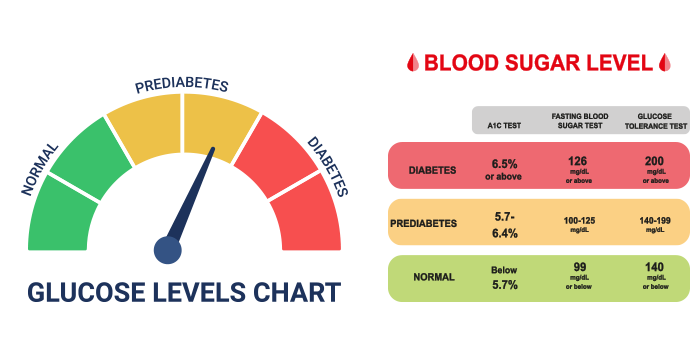The Facts
about Glucose

Glucose
Glucose is the main type of sugar in your blood and your main source of energy for your body’s cells. Glucose comes from the foods you eat and is carried to your cells through your bloodstream. Several hormones, including insulin produced in your pancreas control glucose levels in the blood.
When you consume food, your blood sugar goes up. This rise in blood sugar normally signals your pancreas to release insulin, a hormone that acts like a key to let the blood sugar leave your bloodstream and enter your body’s cells. Insulin helps control your blood glucose level to keep it in a healthy range.

If you are diabetic, however, your body typically 1) does not make any insulin 2) does not make enough insulin, or 3) cannot use the insulin your pancreas produces as well as it should.
When there is not enough insulin in your body, or your cells stop responding to insulin, too much blood sugar remains in your bloodstream and your blood sugar levels get too high. Over time, this consistently high level can damage your organs and cause serious health problems such as heart disease, kidney disease, and loss of vision, among other complications.
There are three main categories of diabetes. While all three share the characteristic of high blood glucose (sugar) levels in the blood, there are notable differences with each type.
The 3 main types of diabetes
The three main types of diabetes are type 2, type 1, and gestational diabetes (diabetes during pregnancy).
Type 2 Diabetes
Type 2 diabetes occurs when your body does not use the insulin your pancreas produces effectively. Your body is not able to keep blood sugars at normal, desirable levels. About 90-95% of people with diabetes have type 2 diabetes. Unlike type 1, type 2 develops over many years rather than suddenly. In the past, type 2 diabetes was usually an adult disease. Today, however, more and more children, teens, and young adults are being diagnosed with type 2 diabetes due to lifestyle habits and other variables.
Type 1 Diabetes
Type 1 diabetes is believed to be caused by an autoimmune reaction (the body’s immune system attacking itself by mistake). With type 1 diabetes, T cells attack the beta cells in the pancreas, destroying the body’s ability to produce insulin. Without insulin, glucose (sugar in the blood) cannot enter cells to produce energy. The symptoms of type 1 diabetes often develop suddenly and include chronic thirst, frequent urination, blurry vision, deep fatigue, or life-threatening diabetic ketoacidosis.
Left untreated, type 1 diabetes can cause dehydration, weight loss, nerve and blood vessel damage, organ damage, and life-threatening diabetic ketoacidosis (DKA). DKA is a serious complication of diabetes that occurs when the body produces high levels of blood acids called ketones as a result of low insulin levels. In the case of DKA, immediate hospitalization is needed.
Gestational Diabetes
Gestational diabetes develops during pregnancy in women who may have never had diabetes. If gestational diabetes develops during pregnancy, your baby could be at higher risk for certain health problems. Gestational diabetes usually goes away after your baby is born, but having gestational diabetes while pregnant, does, unfortunately, increase your risk for type 2 diabetes later in life. Also, your baby is more at risk for becoming obese as a child or teen and for developing type 2 diabetes later in life, too.
What is Pre-diabetes?
With pre-diabetes, blood sugar levels are higher than normal, but not yet high enough to be classified as type 2 diabetes. In the United States, more than 1 in 3 people (approximately 96 million) have pre-diabetes and more than 8 in 10 of these individuals do not know they have it.
Pre-diabetes significantly raises your risk for type 2 diabetes, heart disease, and stroke. Without proper attention and personal commitment, the likelihood of pre-diabetes developing into type 2 diabetes is high. The good news about pre-diabetes, however, is that it can be reversed with the right lifestyle and diet changes.
Our diabetes treatment services support those with pre-diabetes, type 2 diabetes, type 1 diabetes, or gestational diabetes. All types are characterized by high blood glucose (sugar) levels in the blood that result from the body’s inability or ineffectiveness in producing and using insulin, the hormone that helps to control blood glucose levels.
When treating chronic diseases like diabetes, it’s important to develop meal plans and strategies that work for you and your family.
If you think you may have pre-diabetes, type 2 diabetes, type 1 diabetes, or gestational diabetes, consider if you’ve experienced these symptoms:
- Always tired
- Always thirsty
- Always hungry
- Frequent urination
If so, we’re committed to helping you improve your symptoms, reduce your risk of long-term complications and manage your disease. Our team of doctors, nurse practitioners, dietitians and certified diabetes educators are ready to assist you in improving your quality of life by starting our diabetes treatment today.
Call us at (919) 354-7077 or fill out this form to discuss your diabetes prevention or management options.
Sources:
- Centers for Disease Control and Prevention, https://www.cdc.gov/.
- Mayo Clinic, https://www.mayoclinic.org/.
- Johns Hopkins Medicine, https://www.hopkinsmedicine.org/health.
- Cleveland Clinic, https://my.clevelandclinic.org/health/diseases.
